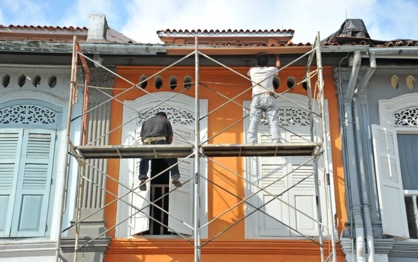 The BPIE has carried out this Study at the request of the Renovate Europe Campaign at a time when the topic of energy renovation seems to be on everyone’s lips. The request was made following the realisation that an overview of recent research on the job creation and macro-economic benefits of energy renovation in the EU has not been compiled in almost 6 years. The findings are encouraging, in the sense that much research has taken place at all levels – national level, European level and global level – and that the stimulus effect of investing in energy renovation is great.
The BPIE has carried out this Study at the request of the Renovate Europe Campaign at a time when the topic of energy renovation seems to be on everyone’s lips. The request was made following the realisation that an overview of recent research on the job creation and macro-economic benefits of energy renovation in the EU has not been compiled in almost 6 years. The findings are encouraging, in the sense that much research has taken place at all levels – national level, European level and global level – and that the stimulus effect of investing in energy renovation is great.
This makes this short Study a valuable contribution to the debate on how and where to spend the large funds that are being mobilised to help the EU and its Member States recover from the economic impact of tackling the COVID-19 pandemic.
Key Findings
In its review of 35 research reports, the BPIE highlights the following main findings:

On jobs and economic impact:
- For every €1 million invested in energy renovation of buildings, an average of 18 jobs are created in the EU. These are local, long-term jobs that will stimulate economic activity across the EU
- The number of jobs created per €1 million invested varies across the EU depending on national circumstances and employment cost. The Study reports that those numbers are: Croatia, 29; Estonia, 17; Finland, 16; Italy, 15 and Spain, 18
- At national level, the Study found that it costs an average of €14,000 to create a job in construction in Spain, whilst in the same country it costs €20,000 to support an unemployed worker. In addition, for each €1 of public money spent on energy renovation, the Spanish government gets €0.62 in return within one year, mainly via taxation.
On macro-economic benefits by building segment:
- Holistic, energy efficient renovation of office buildings increases productivity by about 12% leading to a potential benefit of about €500 billion to the economy per year
- Well-designed and executed energy renovation of hospitals reduces the average patient stay by about 11%, producing potential savings of about €45 billion per year to the healthcare sector
- For homes, it was found that in France medical costs of about €930 million per year are linked to poor quality housing. If we include the indirect consequences of such ill-health (absenteeism, lower productivity etc.), poor quality housing could be costing the French economy as much as €20 billion per year.
The clear message that comes from this Study is that investing in the energy renovation of our building stock is a very rewarding choice. It brings personal benefits, societal benefits and economic benefits. It is now up to each Member State of the EU to include energy renovation of our building stock in their Recovery and Resilience Plans so that the promised Renovation Wave can be successfully rolled out to the benefit of all.

